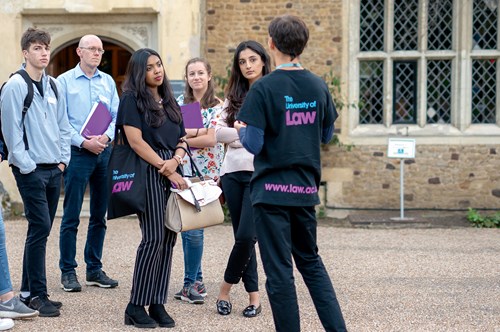Unique modules such as Professional Development and Applications of Professional Psychology enhance your future career prospects.
Make an Enquiry

Enquiry form could not be loaded
Thinking of a career in psychology? Or just want to expand your knowledge in the field? Studying MSc Psychology (Conversion) at The University of Law is a great place to start. Specifically designed for non-psychology graduates, this course is a great introduction to critical psychological skills, knowledge and values applied to real world contexts.
Our on-campus courses are pending accreditation with the British Psychological Society (BPS), which gains you Graduate Basis for Chartered Membership (GBC) with the BPS and enables you to progress in a career towards becoming a Chartered Psychologist. We are working closely with the BPS in the final stages of the accreditation process, ensuring our curriculum meets the rigorous requirements of an accredited programme - an important mark of quality that is highly valued by employers.
You can also study our BPS accredited MSc Psychology (Conversion) online.


An undergraduate degree at 2:2 or above in any discipline (or equivalent).
Undergraduate Psychology degrees accredited by the BPS cannot be accepted for this programme.
Entry requirements
If you're looking for a more flexible approach to your studies, why not consider our online study option?
If you’re looking to make the change to psychological study and already have an undergraduate degree in another discipline, then our Master’s in Psychology Conversion course is your place to start.
On completion, you’ll be equipped with core knowledge and understanding of key psychological theories, principles and concepts, that can be applied to everyday life as well as a professional setting. You’ll have also built skills in scientific reasoning, be able to understand the role of evidence and make critical judgements in psychological arguments.
Employability is embedded into this course from the beginning. Our unique Professional Development and Applications of Professional Psychology module will allow you to explore and prepare for your career while you study.
You’ll graduate with skills such as problem solving, research, communication and self-evaluation – competencies that can be applied to future studies, as well as enhancing your professional skills.
Career opportunities in Psychology
Successful completion of this course, once BPS accredited, will allow you to pursue further education (like a PhD), working towards becoming a Chartered Psychologist, such as a Clinical Psychologist, Educational Psychologist, Health Psychologist, or Forensic Psychologist. A master's in psychology will also enhance your employability in areas such as health, education, management, marketing, policing, and beyond. For careers in these related industries, it is not essential to undertake a BPS accredited programme.
What is BPS accreditation?
Courses accredited by the British Psychological Society (BPS) gain you Graduate Basis for Chartered Membership (GBC), which enables you to progress towards a career as a Chartered Psychologist. It is a widely recognised and valued mark of quality by employers, however it is not essential if you do not wish to pursue a career as a Chartered Psychologist.
Our online MSc Psychology (Conversion) is accredited by the British Psychological Society (BPS). Our on-campus Master's in Psychology (Conversion) courses are pending accreditation and we are working closely with the BPS in the final stages of the process.
Why study the MSc Psychology (Conversion) with us?
The application deadlines for our September 2024 intake are as follows:
Year one
Year two
Neuroscience of Behaviour
This module is the study of the biological bases of human behaviour, using quantitative design and analysis and considering ethics. You will use methods including the recording of physiological signals and brain-imaging techniques to address questions such as: What is the relationship between genes and behaviour or bodily reactions and emotion? What is the purpose of sleep? How are memories stored in the brain?
Cognitive Psychology
In this module you will develop knowledge of theories, concepts, and research about human cognition. Covering a range of topics and approaches to understanding Cognition, including the historical roots, conceptual aspects to the subject area, social cognition, mental representation, decision making, memory, language, and consciousness.
Personality and Individual Differences
Reviewing the main theories of personality and using contemporary empirical evidence you will explore the complex relationship between personality and behaviour. With sessions focusing on personality disorders and problems assessing and classifying such disorders, the module will also enable you to examine some of the broader societal issues relating to individual differences in personality.
Social and Critical Psychology
This module will introduce you to new topics within social psychology, but arguably more importantly, new perspectives by which to view topics such as social constructionism, social psychology of the self, problems of experimental social psychology, group performance and decision making, and crowd behaviour.
Lifespan Development
Exploring key theories of psychological development throughout the lifespan you will learn to think critically about these theories and consider how psychological wellbeing could be enhanced at every stage of a person’s development.
Applications of Professional Psychology
In this module you will consider the pragmatic, ethical and methodological aspects of applying psychological principles and knowledge to real-life contexts by learning how psychology is used in a range of professional practices, such as health, education, sport and may other professional psychology careers, helping to inform your own future career choices.
Research Methods
By developing your ability to design psychological investigations and assess the data collected, and understanding the ethical implications of various methods used, on this module you will develop a range of transferable skills that are highly valued in employment settings, including communication, numeracy and critical thinking.
Dissertation
This module involves an independent research study in a clearly defined area of psychology involving both a theoretical and an empirical component. You will be supported by tutors to develop the study in an area that you are passionate about, helping bring to life the knowledge you have gained throughout the course with confidence.
A distinctive element of the course is our in-built Employability module, designed with our conversion students in mind. On this module you’ll be guided through identifying industry relevant experiences, building up a professional network, recognising and articulating your strengths and presenting these via your CV, professional applications, interviews and more. By the end of the module candidates will feel confident to approach graduate level employers and further education opportunities.
Exact days of the week vary per intake and location, however you can expect:
Term 1 example:
|
Day |
Time |
Subject |
Session |
|
Mon |
09:00 - 10:00 |
Applications of Professional Psychology |
Lecture |
|
Mon |
10:00 - 11:00 |
Applications of Professional Psychology |
Lecture |
|
Mon |
13:30 - 14:30 |
Social & Critical Psychology |
Lecture |
|
Mon |
14:30 - 15:30 |
Social & Critical Psychology |
Lecture |
|
Thu |
13:30 - 14:30 |
Applications of Professional Psychology |
Class |
|
Thu |
14:30 - 15:30 |
Social & Critical Psychology |
Class |
Exact days of the week vary per intake and location, however you can expect:
Term 1 example:
|
Day |
Time |
Subject |
Session |
|
Mon |
13:30 - 14:30 |
Social & Critical Psychology |
Lecture |
|
Mon |
14:30 - 15:30 |
Social & Critical Psychology |
Lecture |
|
Thu |
14:30 - 15:30 |
Social & Critical Psychology |
Class |
Study MSc Psychology (Conversion) Online starting September 2024, February 2025 or June 2025
The course demands show you the requirements, prior knowledge and commitments our course will involve.

If you’re looking for the perfect combination of a flexible study programme to fit around your other commitments together with the benefit of our expertise, experience and employability focus, why not consider our online study option


To get a full picture of how studying this course works during the year, take a look at our course date breakdown.
Assessments are designed to meet the programme and module learning outcomes and are both formative and summative. The formative assessments include the preparation and feedback from teaching sessions (e.g. lectures, seminars, workshops and presentations). Summative assessment that contributes to the grade, may include written assignment, group work/studies, project and possibly exams.
We care about your career, which is why we offer support with job applications and other work experience opportunities as soon as you accept your place.
Discover more
You can apply for the MSc Psychology (Conversion) directly with the University.
2024/25 Course Fee (for courses starting on or after 1 July 2024)
Domestic students
London: £10,000
Outside London: £9,450
Non-domestic students
London: £17,000 (or £15,500 including a £1,500 International Bursary*)
Outside London: £16,000 (or £14,500 including a £1,500 International Bursary*)
*Terms and Conditions apply: pdf_students_international-bursary-tcs-2024-25.pdf (law.ac.uk)
By studying a Master's degree you could be eligible for a Postgraduate Loan.
If you’re a ULaw alumnus, you may be eligible to receive our £1000 Academic Master's Alumni Discount.
We also have a range of scholarships and bursaries available to help you invest in your future.
We have students from over 120 different countries throughout our campuses, with a dedicated team to help international students.
If you are an international student and are coming to the UK to study, then you must apply to the Home Office for a visa. In most cases you will need to obtain a Student Route visa. In order to apply for this visa you must be sponsored by an education provider which is licensed by the UK Home Office.
The Home Office has also introduced a Graduate Work visa which allows Graduates to work flexibly, switch jobs and develop their career in the UK for 2 years post completion of a UK degree. The Graduate route is an unsponsored visa, meaning students will not need a job offer to apply for this visa.
Please note that the University does not currently provide visa sponsorship to students for part-time study. We also cannot sponsor students for online courses due to Home Office regulations.